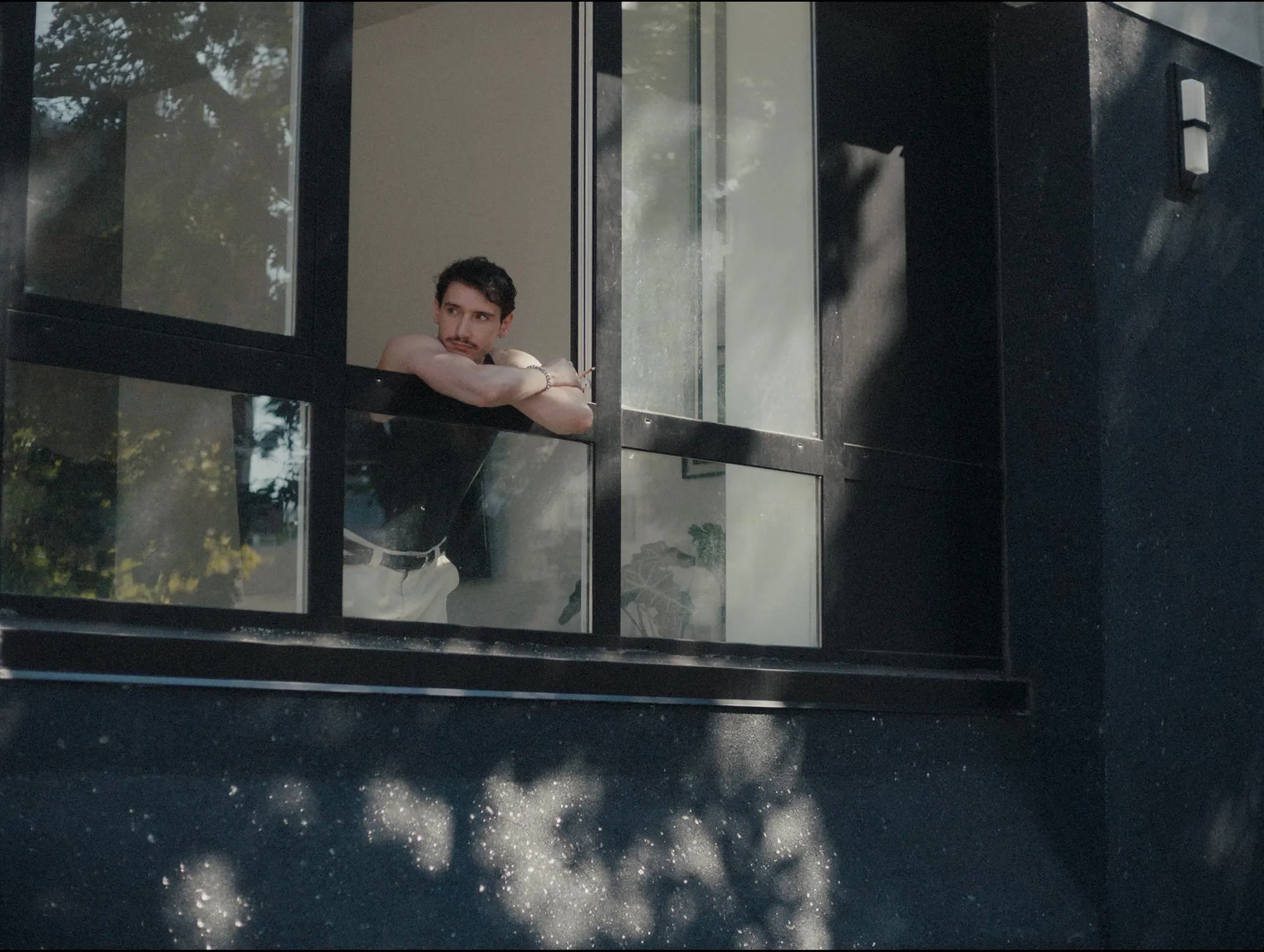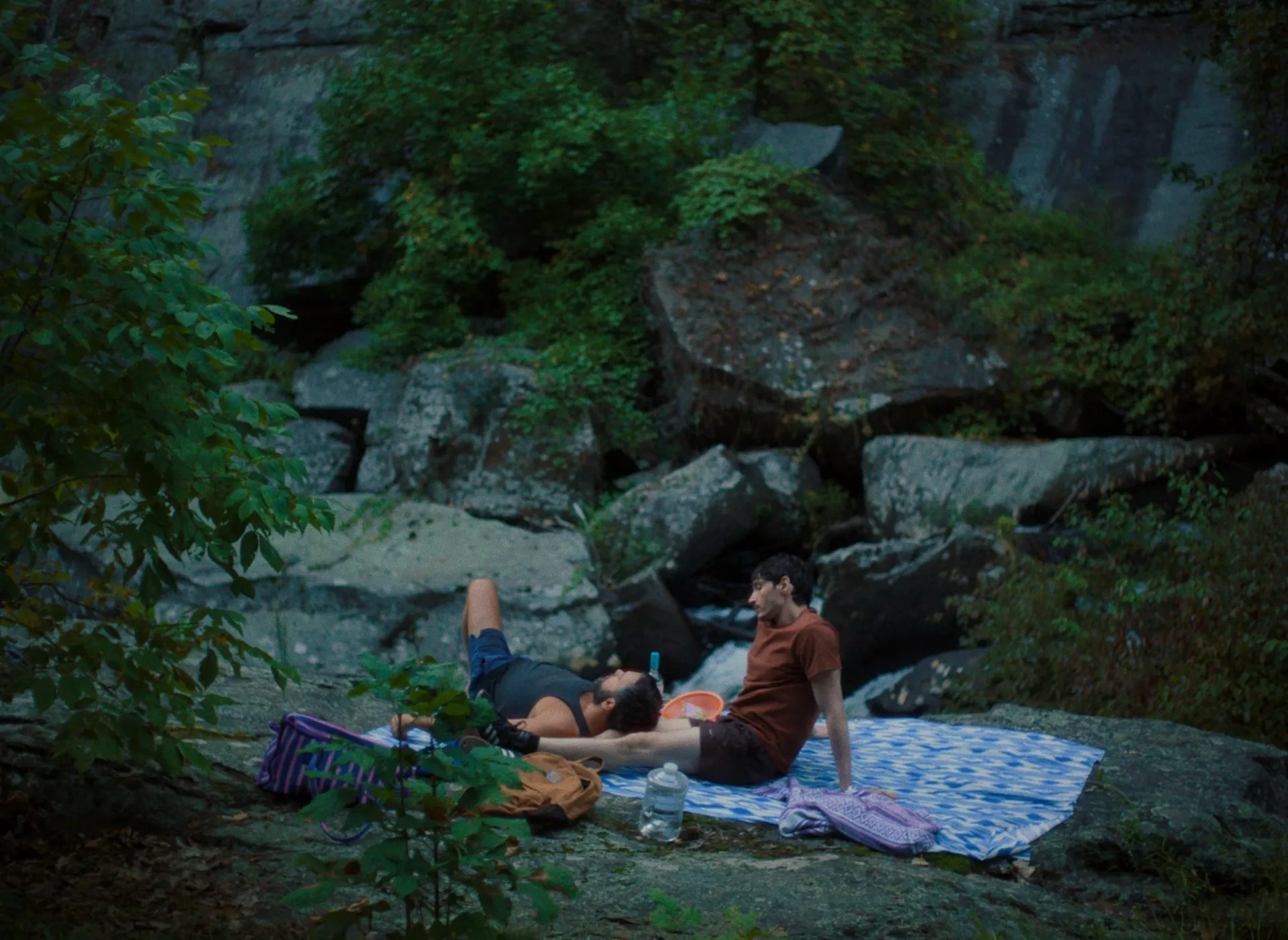The air of a Brooklyn summer night is thick with heat and possibility, a tangible presence in the opening moments of Lucio Castro’s Drunken Noodles. It’s a setting that feels both specific and universal, a quintessential space for the modern rituals of connection and loneliness.
Into this atmosphere steps Adnan, a young grad student adrift for the summer while cat-sitting in a spacious apartment that isn’t his own. His solitude is a quiet hum, punctuated by the glow of his phone. Through a hookup app, he summons a stranger, Yariel, a food-delivery cyclist just ending his shift. Their meeting in a darkened park is swift and almost wordless, a purely physical transaction that quickly resolves its initial purpose.
Yet, what follows is where the film finds its gentle, observant pulse. On a park bench, the two young men, strangers still, share a leftover container of pad kee mao. The act of eating these “drunken noodles”—a shared, messy, flavorful, and temporary experience—becomes a perfect metaphor for their encounter.
This scene establishes the film’s unique tone, one that values the quiet, interstitial moments as much as dramatic events. It presents a world where intimacy is not predicated on history or verbal declaration, but can be forged in a shared silence and a common appetite. We are introduced to Adnan not through exposition, but through his actions within this transient, globalized landscape, a solitary figure seeking contact in a world mediated by screens and fleeting intersections.
The Architecture of Memory
The film immediately challenges conventional storytelling by rejecting a linear path. Its narrative is constructed in reverse chronological order, a deliberate structural choice that transforms the act of watching into a form of emotional archaeology.
We are invited to dig backward into Adnan’s recent past, with each excavated chapter reframing our understanding of what came before. This technique, familiar in global art cinema that prioritizes psychological truth over plot mechanics, forces an active engagement from the viewer. We are not passive recipients of a story; we are participants in the assembly of a memory.
The structure unfolds in precise segments. We start in the New York summer with Adnan’s tentative, evolving bond with the cyclist Yariel. Then, the film retreats to the previous year in the rustic woodlands upstate, revealing a formative and sensual encounter with Sal, an older artist whose influence looms over Adnan’s present.
The final temporal jump takes us back further still, uncovering a moment of poignant emotional context that serves as the catalyst for Adnan’s entire journey of exploration and disconnection. This fractured timeline does more than just provide backstory; it mirrors the non-linear way we process our own lives.
Adnan’s apparent aimlessness in the film’s opening chapter is retroactively imbued with weight and meaning, his quietude becoming a landscape shaped by events we are only just beginning to comprehend. The structure itself becomes a statement on how identity is a puzzle, assembled from pieces of our past that we continually revisit and reinterpret.
Folklore, Flesh, and Phantasm
At the film’s thematic core is a rich interplay between tangible art, physical desire, and surrealist fantasy. This is most vividly expressed through the work of the artist Sal, whose creations are central to the film’s visual and emotional language. His art consists of intricate, colorful, and explicitly erotic needlepoints.
These pieces, depicting all-male orgies and sexualized fairytale figures, function as a kind of contemporary queer folk art. The very medium—traditionally domestic, patient, and coded as feminine—is subverted to chronicle a provocative and distinctly masculine sexuality, creating a powerful juxtaposition. This art is not decorative; it is a physical manifestation of the characters’ desires and a testament to a hidden history of queer fantasy.
The film’s frank, non-judgmental depiction of sex mirrors the honesty of Sal’s tapestries. Physical encounters are treated as a valid and revealing form of character study, a language as potent as dialogue. This approach feels distinctly separate from the often-sanitized intimacy of mainstream American film.
Yet, just as the viewer settles into this naturalistic mode, Argentinian director Lucio Castro confidently injects elements of magical realism, a narrative tradition with deep roots in Latin American literature. Surreal sequences—portals to idyllic gardens appearing in public parks, a woodland encounter that dissolves into a pornographic version of a Shakespearean dream—are presented with a straight face.
These are not mere whimsy; they are an exploration of Adnan’s psyche, a way to visualize the intersection of his spiritual and carnal longings. It is a bold transplantation of one culture’s storytelling traditions into another, suggesting that to fully understand desire, one must be willing to step outside the bounds of reality.
A Portrait in Stillness
The entire contemplative structure is anchored by Laith Khalifeh’s remarkably understated lead performance. As Adnan, he offers a masterclass in minimalist acting, portraying a character defined more by watching than by speaking.
His interior world is conveyed through the smallest of gestures: the way his gaze lingers on a piece of art, a barely perceptible tensing of his shoulders, a fleeting smile that carries the weight of unspoken thoughts. His stillness is not emptiness but a rich, contained landscape of emotion, demanding that the audience lean in and observe closely.
This nuanced performance is amplified by the film’s precise technical craft. Director Lucio Castro and cinematographer Barton Cortright cultivate an unhurried, drifting pace that immerses the viewer in Adnan’s subjective state.
The visual style favors airy natural light that streams into apartments and dapples through forest leaves, contrasted with a deep, “sweat-dampened” color palette for its nocturnal and more sensual scenes. The editing is economical and rhythmic, creating a sense of life unfolding in slices rather than in a forced dramatic arc.
Complemented by a sparse, irregular musical score that surfaces only to subtly heighten a mood, these aesthetic choices create an atmosphere of deep contemplation. The film’s form perfectly mirrors its content, capturing the feeling of a young person floating through a formative, hazy season of his life, quietly observing the world and, in the process, discovering the outlines of himself.
Drunken Noodles premiered in the Cannes Film Festival’s ACID sidebar on May 18, 2025.
Full Credits
Director: Lucio Castro
Writers: Lucio Castro
Producers and Executive Producers: Lucio Castro, Baron Cortright, Joanne Lee, Julia Bloch
Cast: Laith Khalifeh, Joél Isaac, Ezriel Kornel, Céline Clermontois, John Arthur Peetz, Guillermo García Arriaza, Matthew Risch
Director of Photography (Cinematographer): Baron Cortright
Editors: Lucio Castro
Composer(s): Yegang Yoo, Robert Lombardo
The Review
Drunken Noodles
A thoughtful and beautifully constructed film, Drunken Noodles rewards patience. Its reverse chronological narrative and languid pace create a deeply atmospheric and contemplative portrait of modern queer intimacy. Director Lucio Castro confidently blends frank sexuality with flights of magical realism, crafting a story that is both intellectually stimulating and emotionally resonant in its quiet, observational style. It is a subtle, artfully made picture about the fleeting connections that define us.
PROS
- Intelligent, non-linear structure that deepens the emotional impact.
- Atmospheric cinematography that perfectly captures a humid, sensual mood.
- A frank and insightful exploration of desire, art, and intimacy.
- A powerful and understated lead performance from Laith Khalifeh.
CONS
- The deliberately slow, meandering pace may not engage all viewers.
- Its emotionally reserved tone might feel detached to some.
- The fractured narrative demands close attention.


















































